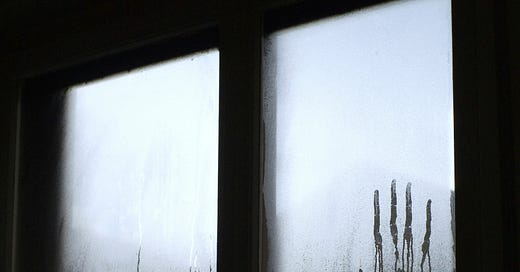When I was young, I was easily scared. I mean really easily. In my childhood home, the living room was adjacent to the kitchen.
In the evenings, when I would watch Scooby-Doo, I’d sit in front of the TV until I couldn’t take it anymore. As the villain or monster chased the Mystery Inc. crew around, terror would bubble its way up my legs–a battery charge propelling me to jump up and sprint into the kitchen, into safety.
I’d run back and forth like this for as long as it took. To my parents’ credit, they never made me feel ridiculous. They allowed me to be afraid. My mom loved scary, spooky things. She watched true crime, she loved The X-Files, and she read mysteries and thrillers constantly (mixed in with her steady intake of artist biographies). I did not inherit this steely sense of nerves.
In fact, as a kid, my mom took my dad and me to see a Czech film, Otesánek (English translation: Little Otik) by the famous Jan and Eva Švankmajer, that was screening at the Museum of Fine Arts Houston.
The 2000 film is based on a Czech fairy tale, so my mom assumed that I—probably around 8 to 10 at the time—would be a fine audience member. This film is a dark horror comedy film, but I don’t remember any comedy. I won’t spoil it for you, and the movie is definitely more implied horror than actual, but I began to cry. My dad took me out of the viewing, and we walked around the museum till it was over.
When I was in college, I justified it by saying, “I’m already scared all the time.” It was sarcastic, but it worked. “I’m already traumatized.” I think, in truth, some of my unsafe experiences as a child (nothing to do with my parents) made me feel unsure about how my body would know what was pretend fear and what was real. I was afraid I wouldn’t be able to tell the difference, that the fear or nightmares I’d experience from a spooky film would pervade days of my life; that I was inviting something in I couldn’t control or prevent.
In 2019, my feelings about horror changed. My mom was diagnosed with stage 4 pancreatic cancer. I was in despair. I was livid. I remember sitting on the plane back to New York City, flipping through available movies to watch on the seat monitor, and picking a horror film that I normally would have avoided. “How can I be afraid of something made up when my worst fear is actually happening?” I felt numb, but, also, a little bit braver. “Nothing is scarier than what I’m going through.”
the liminal space
Throughout the years, my enjoyment of horror has been bolstered. In the aftermath of my mom’s death in December 2022, waves of cognitive dissonance and grief would, at times, overwhelm me. For my mom’s birthday in March 2023, I watched The Exorcist, a movie she liked. There is a scene that held up a mirror, albeit warped, to my life.
It’s a scene that plays out across the genre: the main character, or those witnessing the horror, are not believed. Chris McNeil is seeking help for her daughter, Regan, after she’s begun to exhibit strange behavior. This is a kind of liminal space; a tipping point. The protagonist exists in two realities— the one of normalcy and their newer experience of the world, which is often forced upon them. Chris has a moment of breaking down when, finally, Father Karras and Father Dyer seem to believe that her daughter is ill. Things are exactly as bad as she thinks, if not worse. And they will do their best to survive this, but it will come with great risks.
Grief is a lot like that. Trauma is a lot like this, too. People outside of an experience simply don’t understand until the curse, the monster, the serial killer, the cancer, the death of someone close, touches their lives, too.
Watching horror movies and, to some extent, reading books of the genre, frees me from the feelings that I still struggle with, at times, after losing my mom. I feel seen by characters who question their sense of reality, who feel or see things others seem not to—whose experience of the world is different, often somehow permanently, even if some sense of order is restored to the world.
While I think you can “recover” from the traumatic elements of grief to a degree, I don’t believe grief ever goes away. And I wouldn’t want it to, even if I could push a button that would remove the painful parts of loss.
In a society that prefers optimistic cliches like, “She’s in a better place,” or “You’ll be okay,” or “It’ll get better,” horror is a great reminder that we might survive the worst, but that doesn’t mean we should act like it doesn’t happen. It’s not an either/or binary. While I could wax philosophically about how pain is inevitable but suffering is optional (if you ask Buddhists), and there may be truth in that, I think love creates an attachment I would never want to avoid. And that means grief will be there, too. Grief is the mark of having deep connection, of feeling its absence.
Some days, when grief is a dark storm cloud, I put on a movie like Scream 2–the last movie I watched with my mom, sitting beside her while she was in at-home hospice in November 2022–and I let myself experience fear, pain, and loss from the safe distance of a screen, comforted by knowing that I’m not alone. There isn’t an ending credit sequence to what I’ve lived through, and there isn’t a monster to slay, but I will hold grief’s hand, instead of running from the feeling, as the fear rises and falls through my body, on the good days and the bad.




